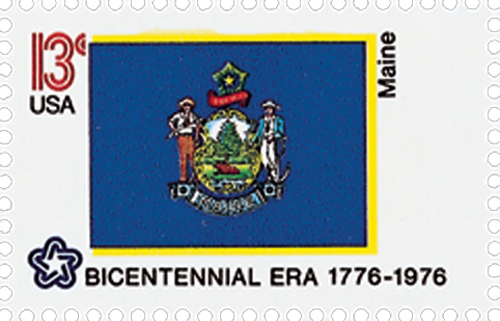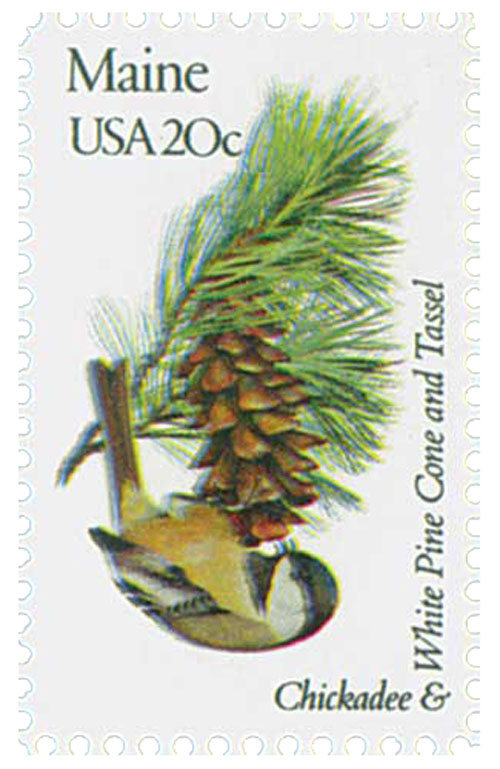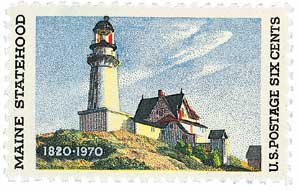
# 3579 - 2002 34c Greetings From America: Maine
Maine
34¢ Greetings From America
City: New York, NY
Quantity: 200,000,000
Printed by: American Packaging Corp for Sennett Security Products
Printing Method: Photogravure
Perforations: Serpentine Die Cut 10.75
Quantity: 200,000,000
Maine Admitted To The Union
Before European settlement, thousands of Indians lived in Maine. Most belonged to the Abenaki and Etchemin tribes of the Algonquian Indian family. The Iroquois Indians frequently attacked these people, and they were bitter enemies.
Vikings led by Leif Erikson may have visited Maine around 1000 A.D. In 1498, John Cabot, an Italian captain in the service of England, reached Maine. France also sent many explorers to the area, including: Giovanni da Verrazzano in 1524; Pierre du Gua de Monts, in 1604; and Samuel de Champlain in 1604. Champlain named Mount Desert, the largest island on the Maine coast.

Two wealthy Englishmen, Sir Ferdinando Gorges and Sir John Popham, sent George Weymouth to explore the coast of Maine. Weymouth’s report encouraged Gorges and Popham to attempt settlement. In 1607, a group of colonists established Popham Colony, near the mouth of the Kennebec River. Popham’s death and troubles with Indians forced the colonists to return to England a year later. Interestingly, during their stay in Maine, the colonists made the first boat built by the English colonists in America, the Virginia.

In 1622, the Council for New England granted Ferdinando Gorges and John Mason a large tract of land that extended through much of present-day Maine and New Hampshire. Perhaps the first permanent English settlement was founded near today’s city of Saco in 1623. Several more English settlements followed. In 1629, Gorges and Mason divided the land, and Gorges took control of Maine. Gorges established Maine’s first government in 1636. In 1642, he chartered the first English city in what is now the United States, Georgeana (now York). By 1658, Maine was made part of the Massachusetts Bay Colony. However, the Gorges family fought for their claim. In 1677, Massachusetts finally took control of the colony by purchasing it from the Gorges family.
During the French and Indian Wars, the British and French and their Indian allies battled for control of the New England region. A great deal of fighting took place in Maine. One of the key events of the war was the English capture of the French fort of Louisbourg, Nova Scotia, in 1745. William Pepperrell of Maine led the attack on the fort. The French and Indian Wars ended in 1763 with the Treaty of Paris. With this treaty, France relinquished most of its land claims in the New World.
Maine
34¢ Greetings From America
City: New York, NY
Quantity: 200,000,000
Printed by: American Packaging Corp for Sennett Security Products
Printing Method: Photogravure
Perforations: Serpentine Die Cut 10.75
Quantity: 200,000,000
Maine Admitted To The Union
Before European settlement, thousands of Indians lived in Maine. Most belonged to the Abenaki and Etchemin tribes of the Algonquian Indian family. The Iroquois Indians frequently attacked these people, and they were bitter enemies.
Vikings led by Leif Erikson may have visited Maine around 1000 A.D. In 1498, John Cabot, an Italian captain in the service of England, reached Maine. France also sent many explorers to the area, including: Giovanni da Verrazzano in 1524; Pierre du Gua de Monts, in 1604; and Samuel de Champlain in 1604. Champlain named Mount Desert, the largest island on the Maine coast.

Two wealthy Englishmen, Sir Ferdinando Gorges and Sir John Popham, sent George Weymouth to explore the coast of Maine. Weymouth’s report encouraged Gorges and Popham to attempt settlement. In 1607, a group of colonists established Popham Colony, near the mouth of the Kennebec River. Popham’s death and troubles with Indians forced the colonists to return to England a year later. Interestingly, during their stay in Maine, the colonists made the first boat built by the English colonists in America, the Virginia.

In 1622, the Council for New England granted Ferdinando Gorges and John Mason a large tract of land that extended through much of present-day Maine and New Hampshire. Perhaps the first permanent English settlement was founded near today’s city of Saco in 1623. Several more English settlements followed. In 1629, Gorges and Mason divided the land, and Gorges took control of Maine. Gorges established Maine’s first government in 1636. In 1642, he chartered the first English city in what is now the United States, Georgeana (now York). By 1658, Maine was made part of the Massachusetts Bay Colony. However, the Gorges family fought for their claim. In 1677, Massachusetts finally took control of the colony by purchasing it from the Gorges family.
During the French and Indian Wars, the British and French and their Indian allies battled for control of the New England region. A great deal of fighting took place in Maine. One of the key events of the war was the English capture of the French fort of Louisbourg, Nova Scotia, in 1745. William Pepperrell of Maine led the attack on the fort. The French and Indian Wars ended in 1763 with the Treaty of Paris. With this treaty, France relinquished most of its land claims in the New World.












